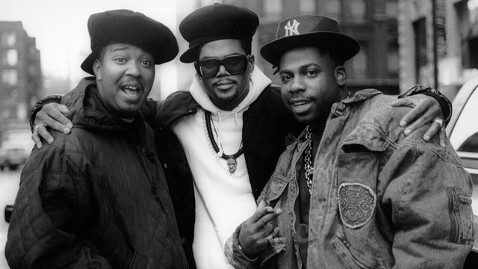Run-D.M.C's Darryl 'DMC' McDaniels Reflects on '80s 'Walk This Way' Cover
The 1980s are fondly remembered for their blinding neon prints, crimped hair, video games, 8-track tapes, "The Breakfast Club." But at its core, it was a decade devoted to creative experimentation, which gave birth to hip-hop, rap and pop.
"People say that everything that happened in '80s music, you know, was bigger than just the music," said rap legend Darryl "DMC" McDaniels of Run-D.M.C. "Even though you have Run-D.M.C., you have Madonna, Prince, Michael Jackson and everything. People say that what we did in the '80s will never, ever be done again because we were the ones that did it. But I think, more importantly, the music, the art, the sports, the journalism, the literature of the '80s was basically the inspiration for everything that was good creatively."
Run-D.M.C, a hip-hop group that emerged in the '80s out of Queens, N.Y., is one of the most influential acts in the genre, and McDaniels is a king amongst rap royalty.
As part of a story about National Geographic's miniseries, "The '80s: The Decade That Made Us," which premieres Sunday, McDaniels talked with " Nightline " about how the culture of the '80s helped hip-hop evolve into a booming sound machine, churning out a message about a grittier life over beats no one had ever dreamed up before.
"One thing that was cool about the '80s was it was just colorful," he said. "Technically I think that's when the term 'flava' was created, because the '80s had so much flavor."

Run DMC in 1980.Credit: Al Pereira/Michael Ochs Archives/Getty Images
By 1986, Run-D.M.C. was riding high on its monstrous success, having been the first hip-hop group in the genre to win a Grammy, have an album certified platinum and have their music video on MTV.
For their third album, "Raising Hell," they brought in famous rap producer Rick Rubin. He suggested Run-D.M.C. consider adding a rock beat to the album, something McDaniels said the group had been experimenting with for a while.
"The reason why we were making the rock/rap music was because we were rhyming over rock beats in the park," McDaniels said, adding that if aspiring rappers couldn't get studio time, they would go to nearby parks to practice.
"If you listen to West Coast music, Dr. Dre sampled everything that was funk. So when we came along, we were like, 'Yo, nobody's using the rock records.' It wasn't like we said, 'We're going to create rock/rap and we're going to become rich and famous and we're going to get on MTV and 'Rolling Stone' and, no, we said, 'Nobody's using the rock records that we used to use when we were in the park.'"
What came out of playing around with rap-rock collaborations was Run-D.M.C.'s cover of Aerosmith's "Walk This Way," which remains one of the most iconic tracks of the '80s.
McDaniels said when they got into the studio, the original idea was just to rap over the guitar riff at the beginning of the song.
"We just knew … that beat and that guitar riff was the def-est thing that we could ever hear," McDaniels said. "We didn't care about Aerosmith. We had never heard Steven Tyler's voice. We just knew that that beat with the guitar riff was one of the def-est things made to mankind's ears."
But as the group started to play around with it, McDaniels said Rubin suggested they re-do the song as a full cover. Steven Tyler and Joe Perry of Aerosmith were brought into the studio to record with Run-D.M.C.
In the studio, Tyler was "like this kid who wanted to do everything," McDaniels said, but guitarist Perry didn't say a word. He would only nod in response to direct questions. But then they started recording.
"The engineer says, 'You ready?' … Rick Ruben pushed the button, [Perry] just started wailing away," McDaniels said.
"Then they are in there doing a mixdown, trying to do a rough mix of the record, and we notice, 'Yo, we really don't need Joe here anymore, someone tell him he could go.'" So Perry got up, takes the cigarette out of his mouth finally, and says, 'Thank you very much, I really enjoyed myself,' and walked out of the session.
"Coolest thing ever."
Run-D.M.C.'s cover of "Walk This Way" went on to became one of the biggest hits of the decade, breaking through the top five on Billboard's Hot 100. The song affirmed the group's crossover status, which helped open doors for major artists from different backgrounds to experiment with each other's sounds and produce new ones.
"Bring the Noise" by Public Enemy and Anthrax, "Real Thing" by Cypress Hill and Pearl Jam, "Numb/Encore" by Jay-Z and Linkin Park and, most recently, Brad Paisley and LL Cool J's controversial song, "Accidental Racist," are just a few of the dozens of song collaborations that have come out since the '80s.
"The thing that is good about hip hop, that old school hip hop from the '80s is this," McDaniels said. "Whether you are in dirt poor ghetto or in your Beverly Hills, whether you are homeless in the city or in high school or in college, when you hear that old school hip-hop music, you can relate because it is not just about one class of people, it is about all of us, and that's what the '80s defines."